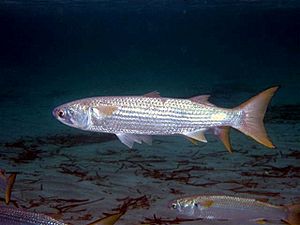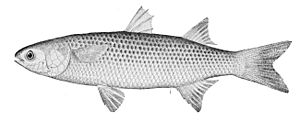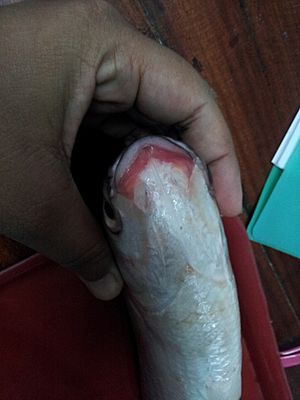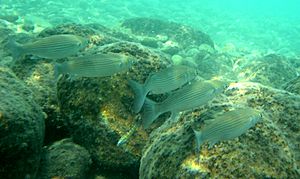Mullet (fish) facts for kids
Quick facts for kids Mullet (fish) |
|
|---|---|
 |
|
| Mugil cephalus | |
| Scientific classification |
|
| Kingdom: | Animalia |
| Phylum: | Chordata |
| Class: | Actinopterygii |
| (unranked): | Acanthomorpha |
| Superorder: | Acanthopterygii |
| Clade: | Percomorpha |
| (unranked): | Ovalentaria |
| Order: | Mugiliformes |
| Family: | Mugilidae Jarocki,Jarocki 1822 |
| Type species | |
| Mugil cephalus Linnaeus, 1758
|
|
| Genera | |
|
See text. |
|
The mullets or grey mullets are a family (Mugilidae) of ray-finned fish found worldwide in coastal temperate and tropical waters, and some species in fresh water. Mullets have served as an important source of food in Mediterranean Europe since Roman times. The family includes about 78 species in 20 genera.
Mullets are distinguished by the presence of two separate dorsal fins, small triangular mouths, and the absence of a lateral line organ. They feed on detritus, and most species have unusually muscular stomachs and a complex pharynx to help in digestion.
Behavior
A common noticeable behavior in mullet is the tendency to leap out of the water. There are two distinguishable types of leaps: a straight, clean slice out of the water to escape predators and a slower, lower jump while turning to its side that results in a larger, more distinguishable, splash. The reasons for this lower jump are disputed, but have been hypothesized to be in order to gain oxygen rich air for gas exchange in a small organ above the pharynx.
Classification and naming
Taxonomically, the family is currently treated as the sole member of the order Mugiliformes, but as Nelson says, "there has been much disagreement concerning the relationships" of this family. The presence of fin spines clearly indicates membership in the superorder Acanthopterygii, and in the 1960s, they were classed as primitive perciforms, while others have grouped them in Atheriniformes. They are classified as an order, Mugiliformes, within the subseries Ovalentaria of the clade Percomorpha in the 5th Edition of Fishes of the World.
In North America, "mullet" by itself usually refers to Mugilidae. In Europe, the word "mullet" is usually qualified, the "grey mullets" being Mugilidae and the "red mullets" or "surmullets" being Mullidae, notably members of the genus Mullus, the red mullets. Outside Europe, the Mullidae are often called "goatfish". Fish with common names including the word "mullet" may be a member of one family or the other, or even unrelated such as the freshwater white sucker (Catostomus commersonii).
The following genera were accepted as making up the Mugilidae:
- Mugil
- Chelon
- Agonostomus
- Cestraeus
- Joturus
- Myxus
- Chaenomugil
- Rhinomugil
- Neomyxus
- Liza
- Trachystoma
- Oedalechilus
- Ellochelon
- Sicamugil
- Aldrichetta
- Moolgarda
- Crenimugil
- Xenomugil
- Valamugil
- Paramugil
However, recent taxonomic work has reorganised the family and the following genera as make up the Mugilidae:
- Agonostomus
- Aldrichetta
- Cestraeus
- Chaenomugil
- Chelon
- Crenimugil
- Dajaus
- Ellochelon
- Gracilimugil
- Joturus
- Minimugil
- Mugil
- Myxus
- Neomyxus
- Neochelon
- Oedalechilus
- Osteomugil
- Parachelon
- Paracrenimugil
- Paramugil
- Planiliza
- Plicomugil
- Pseudomyxus
- Rhinomugil
- Sicamugil
- Squalomugil
- Trachystoma
Timeline

See also
 In Spanish: Mugilidae para niños
In Spanish: Mugilidae para niños




